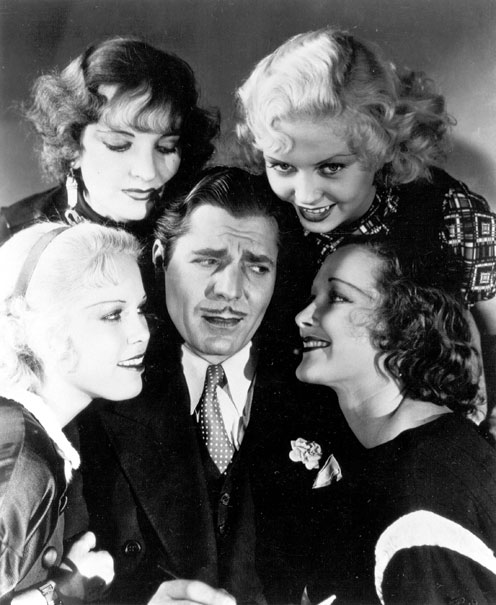It's no news that G and I watch old movies...
all the time. One of the things I enjoy most is noticing the various supporting players, bit players, and even extras who you can spot in film after film.* Hollywood, in the 30s especially, seemed to be a surprisingly small world. With the thousands of actors clambering to get ahead, I find it rather remarkable that the same relative few were getting all the work.
We have a box set of the most famous of the Busby Berkeley films: 42nd Street, Footlight Parade, the Gold Diggers series, etc. For years now, G and I have commented on a particular chorus girl/extra that we see again and again in several of his movies. She's often seen waiting, off-stage or on-, during auditions or rehearsals. But most of the time she's part of the big production numbers. And she's frequently featured in those famous Berkeley "pretty-girl close-ups". And the odd thing, one of the things that makes her stand out, is that she's not actually that pretty. And her figure certainly isn't perfect; her ankles aren't as slim as one might expect. We've always wondered how she ended up so prominently displayed. Was she someone's friend, someone's girlfriend? Berkeley's girlfriend? So far, we've only heard her utter a few words. In Footlight Parade's
Shanghai Lil number she has the most to say; she's one of the prostitutes sitting at the gin joint bar, lamenting Lil's bad influence on the world's oldest profession. Her lyrics are, "That Oriental - dame is detrimental - to our industry."
We always figured we'd never know who she was, always wonder about her life and how it played out. We'd always look for her, wondering. But last night, for the hell of it, G googled that line from the song. And now - quite unexpectedly - she has a name. Donna Mae Roberts.
From IMDB:
Date of birth: 4 November, 1912, Los Angeles, California
Date of death: 1 October, 1996, Gardnerville, Nevada
Donna Mae Roberts was born in Los Angeles. She was the daughter of Walter Roberts and Cora H. Myers. She went to the University of California, where she majored in psychology and belonged to two honorary scholastic fraternities. She left her classes at the end of her junior year to join the chorus. Donna Mae Roberts started as a "Goldwyn girl" in movies, and was a chorus girl in several of the Busby Berkeley movies. She also played small parts in Warner Brothers movies of the 1930s.
Donna Mae Roberts had the highest intelligence quotient of 54 chorus girls given a bona fide test by Prof. Neil Warren of the University of Southern California. Her IQ rating was 132, which falls in the "near genius" class. After the test, Donna Mae Roberts was acclaimed as: "The smartest chorus girl in Hollywood".
Donna Mae Roberts career started to decline in the late 1930s. During that period she did some extra work and then retired from the screen.
Her first husband was Paul Spark, who died in 1943. Her second was Robert Roderick; she had a son by this second marriage.
Donna Mae Roberts died at the Cottonwood Care Center in Gardnerville in 1996. Her body was cremated at Fitzhenry's Crematory.
*
She worked on her first film in 1932. Between 1933 and 1936 she appeared in an astonishing twenty-four films. At least six of them were with Berkeley. She worked once in 1937, and her last job was working with Berkeley again on The Gang's All Here in 1943, apparently the same year her first husband died. Though the earlier Berkeley films were all at Warners, she doesn't appear to have been under contract to a studio. It looks as though she worked for most of them; she worked on a Harlow film at MGM, which we haven't seen, and at RKO in Astaire and Rogers' Roberta.
 |
| In the Honeymoon Hotel number in Footlight Parade. |
In 27 films not once did she receive screen credit. She never got to see her name up on the screen. IMDB lists all of her film work as "uncredited". Which seems so sadly dismissive. And yet, because several of the movies she contributed to have become classics of the art form, preserved as historically and artistically important, are iconic, and because she is so visible in them, she's achieved her own level of immortality. Time has given her that elusive screen credit...and we salute you, Donna Mae.
*
In her first film, Eddie Cantor's The Kid From Spain. She's center right. Center left is better known movie chorus girl, Toby Wing.
Bottom right, in her second film, 42nd Street, beaming at star Warner Baxter. That's Toby Wing, again, top right.
And all wet, front right, in Footlight Parade's famous By a Waterfall.
Certainly, the high point of her career, she was the pinnacle of the revolving wedding-cake fountain of glittering
"dames" that was the finale of
Waterfall, one of the greatest - and most audacious - moments in film history.
*
* (G is very indulgent as I constantly pause movies and say, "Oh, isn't that _ who was in _ ?", "Didn't we see him/her in _ ?" And then I get out my phone, go to IMDB, and look it up to see if I'm right. And I hate to brag, but my batting average is pretty damned impressive.)











